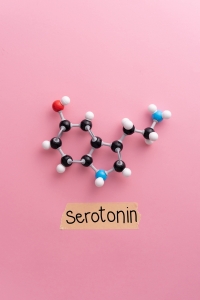Did you know that about 90% of serotonin produced in the human body is done so in the gut. Not only that but our gut and our brain are connected and are in constant communication with one another… This perhaps explains why what you eat, really can affect how you feel.

What is Serotonin
Serotonin is a neurotransmitter (signalling molecule), whose job it is to regulate signal intensity. Think of it like a volume control on the radio; serotonin changes how efficiently brain cells communicate with each other by making signals louder or quieter.
In the brain serotonin has been known to influence a range of behavioural, physiological, and cognitive functions such as memory, mood, sleep and appetite. In the gut – where a staggering 90% of serotonin is synthesised and stored, serotonin plays a role in regulating gastrointestinal (GI) function. Our guts are also home to billions of bacteria (microbiota) and interestingly a certain species of microbiota has been known to promote serotonin production.
We know that serotonin imbalance in the brain can contribute to mood disorders like depression, but lesser known is the impact of peripheral (gut) serotonin.
How is the gut and the brain connected?
The gut and the brain are connected via the gut brain axis (GBA), a two directional biochemical signalling system which carries information between the gut-microbiota (gut bacteria) and the brain. The gut and the brain are also physically connected by the vagus nerve, which too is bidirectional. Because of this constant communication between the gut and the brain, the gut has been coined ‘the second brain’.

Why is it so important?
Imbalances in gut serotonin have been linked to diseases, ranging from irritable bowel syndrome and cardiovascular disease, to osteoporosis. In clinical practice, an association has been identified between gut bacteria imbalances and central nervous system disorders such as autism, anxiety and depression. Also noted is serotonins ability to modulate gut motility, mucus secretion and sensitivity to fullness. When levels of serotonin are skewed, chances of constipation or diarrhoea are increased.
In line with this many other scientific studies have found a strong correlation between disorders of gut-brain interaction caused by gut bacteria imbalances, and mood disorders.
Importantly what we eat directly effects our microbiota and therefore what we eat can indirectly affect how we feel.
End game
This implies that a healthy gut with a diverse microbiome promotes increased serotonin production in the gut. Which in turn promotes a health gut brain axis which can lead to a reduction in mood disorders, heart disease, osteoporosis, autism, IBS, gut health and much more.
This is still an emerging topic and one in which scientists are slowly uncovering, with the hope that better understanding of the gut-brain connection will allow for new targeted therapies for a variety of diseases.
So next time you have a gut feeling… don’t ignore it!
References
Mangiola F, Ianiro G, Franceschi F, Fagiuoli S, Gasbarrini G, Gasbarrini A. Gut microbiota in autism and mood disorders. World J Gastroenterol. 2018; 22(1): 361–368.
Baker DE. Rationale for using serotonergic agents to treat irritable bowel syndrome. Am J Health Syst Pharm. 2005;62(7):700-11; quiz 712-3
Sikander A, Rana S, Prasad K. Role of serotonin in gastrointestinal motility and irritable bowel syndrome. Clinica Chimica Acta. 2009; Pages 47-55
Bornstein JC. Serotonin in the Gut: What Does It Do? Front Neurosci. 2012; 6:16.
Yano JM, Yu K, Donaldson GP, Shastri GG, Ann P, Ma L, Nagler CR, Ismagilov RF, Mazmanian SK, Hsiao EY. Indigenous bacteria from the gut microbiota regulate host serotonin biosynthesis. Cell. 2015;161(2): 264–276.
About Shaz



Leave a Comment: